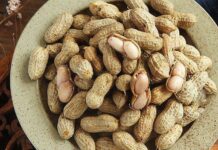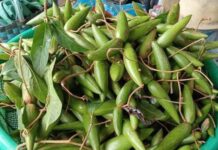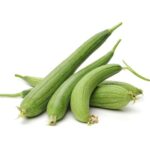1. Inspect the Skin
When examining a bitter gourd, you’ll notice its skin has a textured appearance with small bumps. These bumps are a key indicator of the bitter gourd’s quality.
Larger bumps with more space between them indicate a bitter gourd with thicker, softer flesh and a milder bitterness. These gourds are ideal for stir-fries, soups, or stuffing.

On the other hand, smaller and denser bumps that are unevenly spaced indicate a bitter gourd with thinner, tougher flesh and a more pronounced bitterness. These gourds are perfect for those who relish the natural bitterness.
2. Observe the Shape
The shape of the bitter gourd is also an important factor in your selection. Keep an eye out for the following characteristics:
Bitter gourds with a slender, tapered shape and a relatively straight body tend to be younger, with crisp and sweeter flesh. However, they will have a more bitter taste compared to larger, rounder gourds.
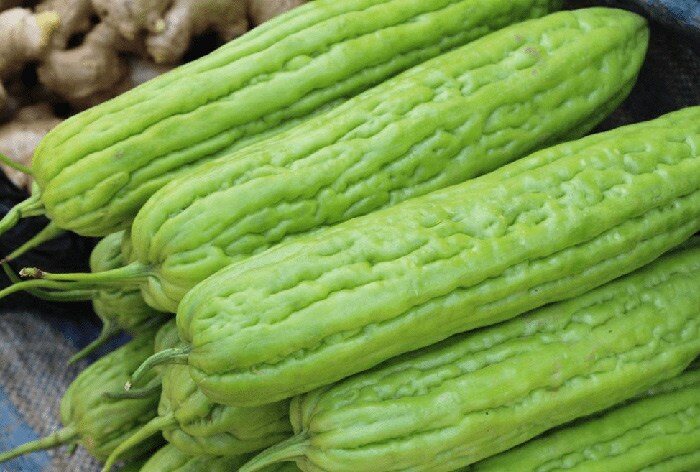
Bitter gourds with larger heads and shorter bodies will have a gentler bitterness. This is an ideal choice for those who prefer a milder bitter taste while still enjoying its unique flavor.
3. Color Considerations
Color is another important aspect to consider when assessing the freshness of bitter gourds:
Fresh bitter gourds have a distinctive emerald green color. These younger gourds are crisp and less bitter. When selecting, opt for those with a consistent green color, free from any bruising or yellow spots.
If a bitter gourd has turned yellow or orange, it’s an indication that it’s mature, with softer flesh and less crispness. Additionally, its bitterness will be significantly reduced.
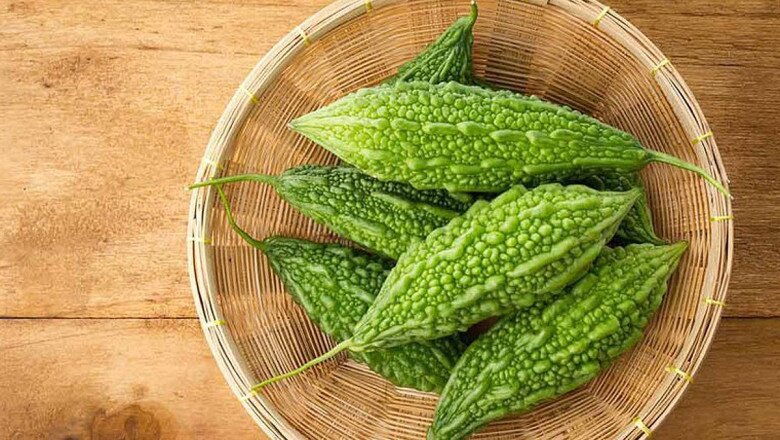
For bitter gourds with a deeper, darker green color, expect a more intense bitterness. This is the choice for those who relish the distinctive bitter flavor.
4. Check for Firmness
In addition to the above factors, the firmness of the bitter gourd is another important characteristic to note:
Younger bitter gourds typically have taut, plump skin and feel heavy and firm to the touch.
In contrast, older gourds will feel softer, with wrinkled skin that slightly yields to gentle pressure. These tend to be less crisp, contain more seeds, and have a milder bitterness.
5. Examine the Stem
A bitter gourd with a fresh, green stem, free from wilting or dark spots, is a sign of its freshness. These gourds are usually crisper, less bitter, and more nutrient-rich.

6. Choose Straight Over Curved Gourds
Bitter gourds with a straight shape have received consistent sunlight during their growth, resulting in a higher concentration of nutrients and a milder bitterness compared to curved ones.
7. Go for a Firm Feel
Bitter gourds of medium size that feel firm to the touch usually have thicker flesh, fewer seeds, and a milder bitterness. Avoid very small gourds (tend to be extremely bitter) or overly large ones (may be spongy and less sweet).
8. Avoid Damaged Gourds
A bitter gourd with a bruised, soft, or discolored skin is a sign of spoilage or a lack of freshness. These gourds often have an intense bitterness and are not pleasant to eat.
Selecting bitter gourds isn’t difficult. With these simple tips, you can confidently choose fresh, less bitter, and crisp bitter gourds for your family meals. We hope these insights will empower you in your future bitter gourd selections.
For more inspiration, check out this video featuring refreshing bitter gourd recipes.
The Ultimate Superfood: A $1 Bargain for Healthy Hair and Glowing Skin
You don’t need to spend a fortune on expensive cosmetics to achieve healthy hair and skin. For just a fraction of the cost, you can nourish your hair and skin with a simple ingredient – water spinach! For only 10,000 VND, you can purchase water spinach and create your own natural hair and skin care treatment at home.
“The Smart Shopper’s Guide to Choosing the Freshest Loofah: A Simple Trick to Look Out For”
Summer is here, and it’s time to whip up some refreshing dishes with bitter melon. But before you get cooking, make sure you know the ins and tricks of choosing the perfect bitter melon. With these tips, you’ll be able to select the freshest, sweetest, and safest bitter melons to take your summer cuisine to the next level.













